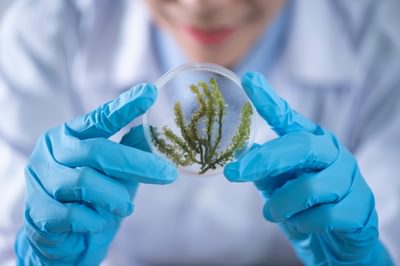
We live in a digital age where we have access to more information than ever before. The only problem is, a lot of this internet information is unregulated, inaccurate and unhelpful! How do you sift through the mass of information available about supplement ingredients and find the facts? The key is to choose good and scientifically backed sources. Here at Vegetology we are a team of scientists who love to dispel myths and provide nutritional supplements suitable for everyone. The Vegan Society and Vegetarian Society are also great sources of information and resources you can trust.
We wanted to debunk 5 common myths when it comes to supplements because we think they’re unhelpful to customers when making decisions about nutritional needs.
MYTH 1: Vitamin D2 is the best option for vegans and vegetarians
This is a common myth that we come across many times and the reason it’s important to debunk is because NOT all forms of Vitamin D are equally effective. Vitamin D2 is often used as an ingredient vegan and vegetarian supplements, derived from plants and vegetables, like mushrooms. However, Vitamin D2 needs to be converted by the body before it can be used. This process isn’t very effective so you actually need a lot more Vitamin D2 in order to receive any health benefits. So why has this myth come about? Well, Vitamin D3 was traditionally found in meat and animal origins, such as the lanolin in sheep’s wool, making it unsuitable for vegans and vegetarians. At Vegetology we created the world’s first Vegan Vitamin D3 source, using a moss-like plant-based origin, lichen, which is naturally high in Vitamin D3. This is a bioavailable form of Vitamin D3, which means the body can use it straight away.

MYTH 2: Carrageenan isn’t safe
This is a good example of where the internet really did go into overdrive in completely inaccurately vilifying a perfectly safe ingredient. Carrageenan inaccurately gets mixed up with concerns that apply to an ingredient called Poligeenan. This is a degraded derivative of Carrageenan used in animal products that isn’t actually permitted for human use anyway. The quality of Poligeenan is low, so safety concerns are valid for that, but the messages that circulated the internet mixed Poligeenan with Carrageenan and resulted in misinformation.
Carrageenan is derived from seaweed. It’s from kelp and has a gum-like substance. Why do we use Carrageenan at Vegetology? It helps to form the soft capsule for Opti3®: Omega-3 EPA & DHA (our high strength Omega-3 supplement) it’s the perfect vegan alternative to gelatin. A surprising number of vegan supplement ingredients are cased in gelatin (Shocking, we know!). Carrageenan is not only safe, it’s used in hundreds of thousands of foods. You may not realise that you’ve consumed foods containing Carrageenan because not all food labels are as accurate as that of our supplements.
We would not dream of using any ingredient, Carrageenan or anything else, unless we were one hundred percent satisfied it was suitable and safe. We have reviewed the vast regulatory safety data on Carrageenan and we are totally satisfied in its suitability. We only use a small amount of Carrageenan in Opti3®: Omega-3 EPA & DHA to help form the capsule itself. Carrageenan is more expensive than starch and sunflower lecithin compound capsules, but we found it to be superior in terms of stability, and also less of it is required (so less ‘filler’ as it were). We obtain Carrageenan from Chondrus Crispus sp. seaweed. It is highly pure.
MYTH 3: Vitamin K1 is better than Vitamin K2
There has been a lot of research done in recent years about the stability and performance of Vitamin K. It was found that K2 actually outperformed K1 across the board as a nutrient. It’s far more expensive, but performance is everything to us. If you wanted to do your own research, Google ‘K1 versus K2’ and you will find a sizeable collection of data that confirms our conclusion.
We use Vitamin K2 in our joint supplement, Bone Care, as it is an important part of a triangle of vitamins and minerals in joint and bone care. Calcium supplements can actually leave deposits in your arteries (known as calcification), contributing to heart disease and Vitamin K2 effectively prevents this calcification, whilst Vitamin D3 helps the absorption of calcium in the blood. Together they make for a great team that gives you a superior joint supplement.
MYTH 4: Algae can contain Beta-Methylamino-L-alanine (BMAA)
Opti3®, our vegan Omega-3 DHA and EPA supplement is derived from algae, which can prompt concerns about Beta-Methylamino-L-alanine (or BMAA for short!). We test Opti3® ingredients for all kinds of toxins that are sometimes found in algae, but what is really important to highlight is that there is no risk of toxins in our algae because of the way that we grow it. The risk of BMAA and other dioxins and PCBS come from the pollution levels in the sea. We grow our algae in a controlled laboratory environment miles away from any ocean to avoid these risks, but we also carry out tests anyway during the development process, just to be sure.
MYTH 5: Multivitamins don’t work effectively
We hear this a lot from people who are considering taking a vitamin supplement, but have read articles on the internet that suggest that multivitamins just don’t work. A common concern we hear is that supplement ingredients just pass through your body, so what you’re essentially paying for is expensive (often brightly coloured) urine! This is a valid concern and it is fair to say that some supplements are not as effective as they are advertised to be. It is all to do with how the supplements are formulated. Different vitamins and minerals are absorbed at different rates and in differing processes by your body. For example, Vitamin B12 is a water based vitamin and so the body grabs what it needs and the rest is expelled. This can lead to brightly coloured urine!
At Vegetology, we spend a long time researching and developing the right formulas and combinations of vitamins and minerals to give your body the maximum opportunity to absorb the ingredients in our supplements. In our multivitamin, MultiVit, we have created a formula of 26 vitamins and minerals that breaks down at varying rates to enable your body to absorb each ingredient at its own rate.
So in short, yes, some multivitamins aren’t as effective as they could be. But with a bit of research and choosing wisely, you can get a really effective multivitamin to support your nutritional needs.
Get accurate information about your supplement ingredients
The internet can be a great source of information if you look in the correct places that promote factual and evidence-based information. You can find great resources and articles about how to choose the right supplements for your needs and fact checks on ingredients like carrageenan. Try checking out the Vegan Society and the Vegetarian Society for more information. We also have lots of interesting and informative content on the Vegetology blog. You can visit us here: